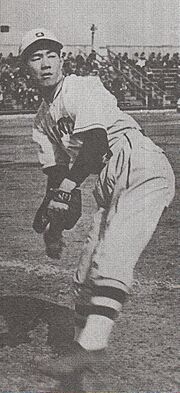Eiji Sawamura facts for kids
Quick facts for kids Eiji Sawamura |
|
|---|---|

Eiji Sawamura
|
|
| Pitcher | |
| Born: February 1, 1917 Ujiyamada, Mie Prefecture, Japanese Empire |
|
| Died: December 2, 1944 (aged 27) SS Hawaii Maru, Pacific Ocean, off Yakushima, Japanese Empire |
|
| debut | |
| July 1, 1936, for the Tokyo Kyojin | |
| Last appearance | |
| October 24, 1943, for the Tokyo Kyojin | |
| NPB statistics | |
| Win–loss | 63-22 |
| ERA | 1.74 |
| Strikeouts | 554 |
| Teams | |
As Player
|
|
| Career highlights and awards | |
|
|
| Induction | 1959 |
Eiji Sawamura (born February 1, 1917 – died December 2, 1944) was a famous Japanese professional baseball player. He was a right-handed pitcher who played for the Yomiuri Giants team in Japan.
Contents
Early Life and a Big Game
Eiji Sawamura was born in 1917. When he was 17 years old, he got to play against some of the biggest baseball stars from America. This happened on November 20, 1934.
Facing Baseball Legends
Sawamura faced a team of Major League Baseball all-stars. These included legends like Babe Ruth, Jimmie Foxx, and Lou Gehrig. He entered the game in the fourth inning. Even though he was a high school pitcher, he was amazing! He struck out nine batters. He only allowed one run over five innings pitched.
Striking Out the Best
A home run by Lou Gehrig in the seventh inning led to Sawamura's team losing. But Sawamura did something incredible. He struck out four famous players in a row: Charlie Gehringer, Babe Ruth, Lou Gehrig, and Jimmie Foxx. The American team's manager, Connie Mack, was very impressed. He even tried to get Sawamura to play in the Major Leagues. But Sawamura chose to stay in Japan because he didn't want to leave his home.
Professional Baseball Career
Sawamura's amazing performance in the 1934 game helped create the Japanese Baseball League. This new league started in 1936.
Joining the Yomiuri Giants
Sawamura joined the Yomiuri Giants, a team in Tokyo. This team was owned by a newspaper called Yomiuri Shimbun. He quickly became one of their best pitchers.
Making History with No-Hitters
He pitched the first no-hitter in Japanese professional baseball history. This happened on September 25, 1936. A no-hitter is when a pitcher plays a whole game without any opposing player getting a hit. He threw two more no-hitters later, in 1937 and 1940.
Awards and Achievements
In 1937, Sawamura had an incredible season. He won 33 games and only lost 10. His earned run average (ERA) was very low, at 1.38. He was named the league's Most Valuable Player (MVP) that year. From 1937 to 1943, Sawamura played in 105 games. He had a career record of 63 wins and 22 losses. He also had 554 strikeouts and a 1.74 ERA.
Later Life and Legacy
In 1939, Sawamura was drafted into the Japanese army. He was allowed to leave his duties during baseball seasons. He played in the 1942 and 1943 seasons.
Tragic End During War
In December 1944, Sawamura was on a troop ship called the SS Hawaii Maru. The ship was traveling to Borneo. On December 2, 1944, a submarine torpedoed and sank the ship. This happened off the coast of Yakushima, an island south of Kyushu. More than 300 soldiers and sailors died, including Eiji Sawamura.
Remembering a Legend
Eiji Sawamura was honored for his contributions to baseball. In 1959, he was inducted into the Japanese Baseball Hall of Fame. There is also a special award named after him called the Eiji Sawamura Award. This award is given to the best pitchers in Japan each year. It is like the Cy Young Award in American baseball.
See also
- The Victory Season: The End of World War II and the Birth of Baseball's Golden Age

